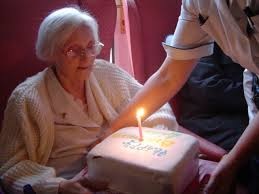 If you are responsible for the care of an elderly person or have an elderly loved one who requires care, we urge you to check out their teeth.
If you are responsible for the care of an elderly person or have an elderly loved one who requires care, we urge you to check out their teeth.
Many elderly folks who were diligent about their oral care throughout their adult lives are currently suffering because they no longer are able physically or cognitively to take care of their teeth. These same people who had regular cleanings and check-ups may be long overdue for dental care and may also not be brushing or flossing as often or as effectively as they did in the past.
For frail elderly, poor dental health can also have a negative impact on nutrition. Recently, Citymeals-on-Wheels in New York partnered with Columbia University College of Dental Medicine to determine the extent of this problem among the low income seniors who receive meals. Their initial findings were startling: 40% of their clients reported that they had difficulty eating, not because of poverty but because their teeth problems (often from years of neglect) had made eating solid food sometimes impossible. Further, some of the seniors physically could not demonstrate an ability to brush their teeth, often because of poor grip strength or other muscular-skeletal issues, often the result of other diseases like stroke or diabetes.
Tooth loss in the elderly is another serious issue. For many, tooth loss is a sign of declining physical and mental health. Tooth loss can often be tied to unhealthy activities like smoking and drinking. Elderly adults who don’t smoke and who drink moderately are more likely to have good overall health and better dental health. When you witness an elderly person begin to lose teeth, however, this is a clear sign that more rigorous action regarding their oral health needs to occur.
When an elderly person is edentulous (has no teeth), that does not mean that they no longer need oral health attention. Many homebound elderly have dentures that need repairing or that fit poorly. In addition, they may not be taking care of their dentures appropriately.
A common problem in senior care facilities is loss of dentures. When this occurs, a cascade of catastrophes can happen. If the resident quits wearing the dentures, their regular food will by necessity modified to only soft foods or pureed foods. For many seniors, even those who complain about their food, meals are stimulating and can be social, too. When the nature of these meals becomes purely nutritive and a rather tasteless soft diet ensues, these seniors have higher incidence of depression.
Often, when dentures are eventually found, after an extended period of time of not wearing them, they may no longer fit or may be painful.
Poor dental care also causes halitosis (bad breath). This impacts socialization and even relationships with family members.
There are many aspects to taking care of our elderly loved ones. Part of ensuring their safety and their quality of life is making sure that their mouths are healthy.